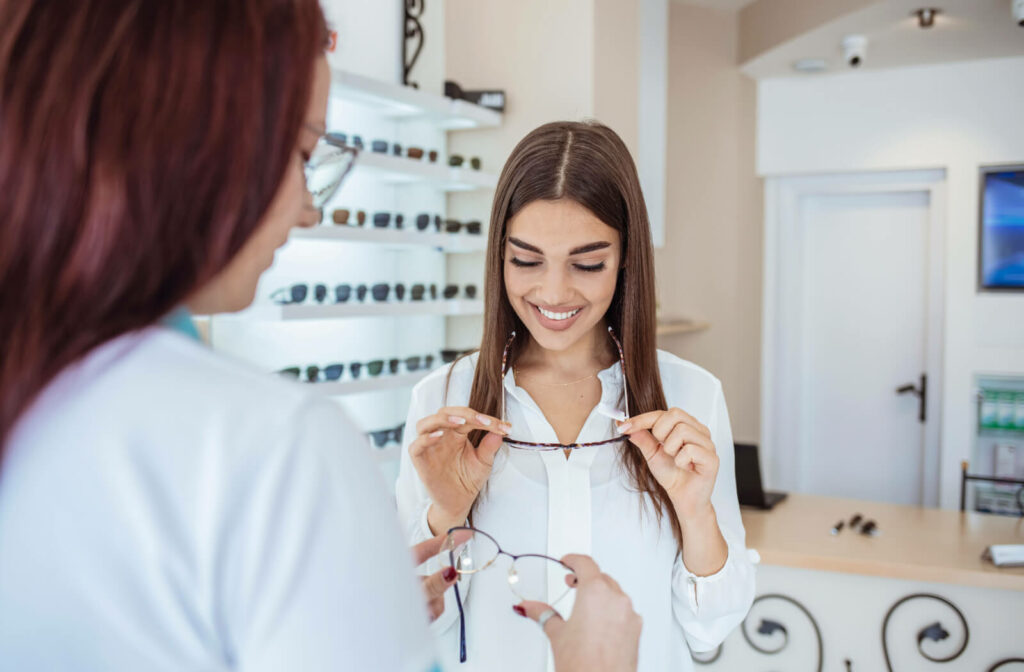Sunglasses are key in protecting your eyes from the sun’s harmful rays. They can make your time outdoors more enjoyable while helping reduce your risk for serious eye conditions like cataracts and macular degeneration. Whether you’re shopping for style or protection, you may wonder if insurance will cover these underappreciated gems.
Depending on your benefits, your insurance may partially or entirely cover prescription sunglasses, but it doesn’t typically cover nonprescription sunglasses. Get familiar with your benefits to learn what sort of vision correction solutions you have available to you.
How Do UV Rays Affect the Eyes?
Every time we head outside on a sunny day, we lather ourselves with sunscreen to protect our skin from the harmful effects of the sun. However, our eyes are also susceptible to damage from UV rays.
UV stands for “ultraviolet,” a form of electromagnetic radiation primarily from the sun. However, UV lamps, tanning beds, and welding can also emit UV rays. Our eyes are incredibly sensitive to UV rays, and prolonged exposure can damage the skin around your eyes, your corneas (the eye’s clear front surface), and penetrate deep into the eyes’ internal structures.
Repeated or long-term exposure can increase your risk of developing eye diseases, such as:
- Macular degeneration
- Cataracts
- Eye cancers
- Melanoma on the eye or eyelid
Even in the short term, exposure to intense UV radiation can sunburn your eyes, a condition known as photokeratitis, and cause:
- Eye pain
- Redness
- Blurry vision
- Headaches
- Dry eyes
- Swelling
Even on cloudy days, UV rays can penetrate cloud cover and bounce off snow, sand, or water, doubling your exposure. So don’t let UV rays take you by surprise. A wide-brimmed hat and a good pair of sunglasses can go a long way toward protecting your vision.
How to Pick Your Sunglasses
Sunglasses can be as much a fashion statement as they are protection. With so many styles and designs available, it can be challenging to choose the right ones for you. As tempting as it may be to pick the pair that looks the coolest, don’t forget your sunglasses have a purpose—protecting your family’s eyes.
Look for 100% UV Protection
The most important factor when selecting sunglasses is ensuring they offer 100% UV protection. Despite what many people believe, the darkness of the lenses is not an indicator of the level of UV protection. Some manufacturers create dark lenses without sufficient UV protection, creating a false sense of security.
In general, lens color doesn’t relate to eye protection, though some tints can affect your vision. Yellow-tinted lenses can help with depth perception in low-light settings and are sometimes used in driving glasses. If you spend a lot of time around water or snow, polarized lenses can reduce glare and enhance visibility. Lenses with a grey base tint typically block the most light and are great on very sunny days. A bronze base tint can increase contrast and is an excellent choice on cloudy days.
Wrap-Around Styles & Larger Frames
If you’re looking for maximum protection from UV rays, wrap-around shades reduce the amount of UV radiation that enters your eyes from the periphery, and larger frames cover more of your face and eyes, offering more protection.
Consider Comfort & Style
Your choice doesn’t have to be all about function. Look for shades that fit well and are lightweight. They should fit snugly on your face without pinching or sliding down your nose. The frames should sit comfortably on your ears, and the arms should rest gently on your temples.
The size of the sunglasses should also be proportionate to your face size. If you have a small face, choose smaller frames; conversely, opt for an oversized silhouette if you have a large face.
Don’t be afraid to try on different pairs until you find the sunglasses that fit your style.
Insurance & Sunglasses
Insurance policies usually cover medically necessary prescription sunglasses. If you wear corrective lenses, your insurance may cover part or all of a pair of sunglasses with the same prescription. But if you purchase nonprescription sunglasses for fashion or leisure, your policy will likely not cover them (some policies give discounts).
Every insurance package offers different coverage for prescription sunglasses, so review your policy carefully. You can also call them directly for more information about your specific policy. We recommend checking with them to see if your plan covers out-of-network optical stores, which may impact your coverage. You may have to pay for the sunglasses upfront and then submit a claim to the insurance provider for reimbursement.
If you plan on submitting a claim to your insurance company for your prescription sunglasses, ensure you get an up-to-date prescription from your optometrist.
Keep all the documentation related to your purchase, including an itemized receipt, a detailed bill, and a copy of your prescription, as some insurance providers require this documentation.

Protect Your Eyes from Sun Damage
If you plan to buy a new pair of shades, ensure you understand your coverage before making a purchase. Protecting your eyes with sunglasses is crucial, and depending on your policy, it could be done without breaking the bank.
Visit our friendly team at Tree City Eyecare to ask about your options for personalized prescription sunglasses. We have shades for adults and kids so everyone can protect their eyes while enjoying clearer vision!Book your eye exam today to explore our selection of sunglasses and keep your family’s prescription up to date.


